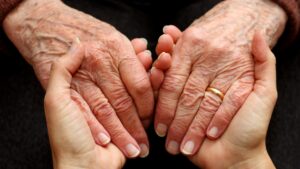Do you have an elderly loved one who you think is battling a mental health illness? You are probably not alone. According to a Center for Disease Prevention and Control report, 1 in 5 elderly adults have a mental health concern but very few receive treatment.
All ages can suffer from mental health problems, but the elderly are more at risk for mental health concerns than the younger population. Elderly mental health is important to a senior’s overall health. A big part of the elderly population is experiencing some form of mental health problem but are struggling to get adequate diagnosis, treatment, and support.
At this point in their lives, physical and mental health are the top concerns in their well-being and can contribute to disabilities.

Prevalence of Elderly Mental Health Problems
According to the World Health Organization, by 2050, the world’s population of elderly over 60 years old is expected to double. This leaves more elderly susceptible to mental health problems.
According to the Centers of Disease Control and Prevention, an estimated 20% of the elderly population have some mental health problem, with anxiety and depression being the most common. While most elderly have good mental health, they are still at risk for developing mental health problems.
Elderly mental health problems are often undiagnosed and unidentified, masked by symptoms of other medical problems. The most common disorders in this age group are dementia and depression, followed by anxiety.
Elderly Mental Health Concerns
Dementia
The most common mental health issue among the elderly is severe cognitive impairment or dementia. Dementia is a chronic or progressive syndrome characterized by a deterioration in the memory, cognition, and behavior in the elderly. The activities of daily living such as eating, dressing, and bathing are also negatively affected. Although a normal part of aging, progressively worsening dementia can be a sign of elderly mental health problems.
According to the Alzheimer’s Association, about 5 million adults aged 65 years and older, or 10% of the elderly population, have Alzheimer’s disease. Just like how the senior population is expected to double by 2050, so will the number of people affected by dementia.
As people age, their memory starts to decline, leading to dementia. Dementia can vary from mild to severe, and severe dementia can make it impossible for the elderly to live alone and independently.
Depression and mood disorders
After dementia, depression is the second most common elderly mental health concern. It affects up to 15% of all adults aged 65 years and older. Depression and mood disorders in the elderly are often undiagnosed and untreated, as family members and caregivers often think of it as normally associated with aging.
Depression causes a great deal of suffering for the elderly, impairing daily life functions. Symptoms are often overlooked, however, an adult with very poor functioning compared to other people of the same age should alert family and caregivers.
Anxiety disorders
Anxiety disorders are often concomitant with depression. Anxiety disorders are a wide spectrum encompassing generalized anxiety disorder, obsessive-compulsive disorders, acute stress disorders, panic attacks, and social anxiety. According to the CDC, up to 8% of those older than 65 years old have been diagnosed with an anxiety disorder.
As people age, they may become more anxious over the future, with children leaving the nest, and dealing with issues over death. Anxiety affects women more than men but equally affects them in terms of stress and nervousness.
Just like depression, anxiety symptoms can be overlooked because they often accompany co-existing psychiatric, medical, and neurodegenerative diseases in the elderly. Anxiety in the elderly can lead to worsening physical, cognitive, and functional impairments in the elderly population.
Loneliness
Loneliness is a distinct entity from depression. It is a pervasive condition common in older people, and they are considered as the most vulnerable population for loneliness. According to a report done by the National Academies of Sciences, Engineering, and Medicine, as much as one-third of the elderly experience loneliness.
Elderly mental health is often complicated by loneliness. They are often hounded by feelings of solitude and isolation, as their children begin to separate away from them. Feelings of loneliness can be problematic, as this leads to feelings of worthlessness. Loneliness can influence brain health in a similar way that stress does to the brain. It leads to an increased risk of other mental and medical conditions.
Looking Out For Elderly Mental Health Concerns
Diagnosing an elderly person’s mental health problem begins at home. Family and caregivers should watch out for any of the following signs which would indicate a mental health problem:
- Changes in the appearance and hygiene practices
- Episodes of disorientation, confusion, and poor decision-making skills
- Weight gain or loss and decrease or increase in appetite
- Altered mood lasting more than a week
- Thoughts of self-harm and ending their own life
- Persistent forgetfulness or short-term memory loss
- Rapid changes in mood from elation to depression
- Unexplained asthenia, anhedonia, fatigue unexplained by other causes
- Social anxiety and withdrawal from other social interactions
When to Seek Help
Elderly mental health is crucial to the well-being of the aged. Keep an eye on your loved ones for early detection of any of these elderly mental health problems. Always observe the elderly for the above-said symptoms and watch out for signs indicating that they might need professional help. Consult with MindShift Psychological Services near me and help your elderly loved one live a more functional life. With locations in Riverside, California, Orange County, California, Corona, California, or Los Angeles, California, you can consult Therapists / Psychologists at MindShift Psychological Services. You can also always take Teletherapy sessions online to heal with MindShift Psychological Services from the comfort of your home.




